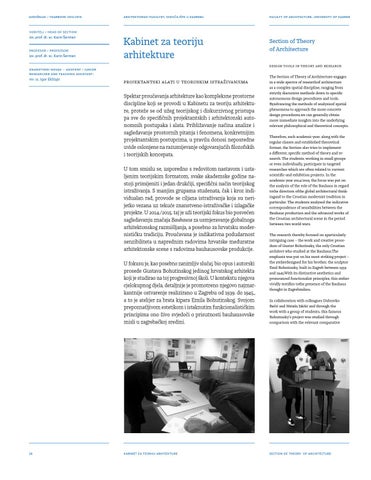godišnjak / yearbook 2014/2015
Voditelj / Head of section: izv. prof. dr. sc. Karin Šerman profesor / professor: izv. prof. dr. sc. Karin Šerman znanstveni novak – asistent / junior researcher and teaching assistant: mr. sc. Igor Ekštajn
Arhitektonski fakultet, sveučilište u zagrebu
Kabinet za teoriju arhitekture
Section of Theory of Architecture Design tools in theory and research
Projektantski alati u teorijskim istraživanjima Spektar proučavanja arhitekture kao kompleksne prostorne discipline koji se provodi u Kabinetu za teoriju arhitekture, proteže se od užeg teorijskog i diskurzivnog pristupa pa sve do specifičnih projektantskih i arhitektonski autonomnih postupaka i alata. Približavanje načina analize i sagledavanje prostornih pitanja i fenomena, konkretnijim projektantskim postupcima, u pravilu donosi neposredne uvide oslonjene na razumijevanje odgovarajućih filozofskih i teorijskih koncepata. U tom smislu se, usporedno s redovitom nastavom i ustaljenim teorijskim formatom, svake akademske godine nastoji primijeniti i jedan drukčiji, specifični način teorijskog istraživanja. S manjim grupama studenata, čak i kroz individualan rad, provode se ciljana istraživanja koja su nerijetko vezana uz tekuće znanstveno-istraživačke i izlagačke projekte. U 2014./2015. taj je uži teorijski fokus bio posvećen sagledavanju značaja Bauhausa za usmjeravanje globalnoga arhitektonskog razmišljanja, a posebno za hrvatsku modernističku tradiciju. Proučavana je indikativna podudarnost senzibiliteta u naprednim radovima hrvatske međuratne arhitektonske scene s radovima bauhausovske produkcije. U fokusu je, kao posebno zanimljiv slučaj, bio opus i autorski prosede Gustava Bohutinskog jedinog hrvatskog arhitekta koji je studirao na toj progresivnoj školi. U kontekstu njegova cjelokupnog djela, detaljnije je promotreno njegovo najmarkantnije ostvarenje realizirano u Zagrebu od 1939. do 1945., a to je atelijer za brata kipara Emila Bohutinskog. Svojom prepoznatljivom estetikom i istaknutim funkcionalističkim principima ono živo svjedoči o prisutnosti bauhausovske misli u zagrebačkoj sredini.
38
Faculty of Architecture, UNIVERSITY OF ZAGREB
Kabinet za teoriju arhitekture
The Section of Theory of Architecture engages in a wide spectre of researchof architecture as a complex spatial discipline, ranging from strictly discursive methods down to specific autonomous design procedures and tools. Byadvancing the methods of analysisof spatial phenomena to approach the more concrete design procedures,we can generally obtain more immediate insights into the underlying relevant philosophical and theoretical concepts. Therefore, each academic year, along with the regular classes and established theoretical format, the Section also tries to implement a different, specific method of theory and research. The students, working in small groups or even individually, participate in targeted researches which are often related to current scientific-and exhibition projects. In the academic year 2014/2015, the focus was put on the analysis of the role of the Bauhaus in regard tothe direction ofthe global architectural thinkingand to the Croatian modernist tradition in particular. The students analysed the indicative correspondence of sensibilities between the Bauhaus production and the advanced works of the Croatian architectural scene in the period between two world wars. The research thereby focused on aparticularly intriguing case – the work and creative procedure of Gustav Bohutinsky, the only Croatian architect who studied at the Bauhaus.The emphasis was put on his most striking project – the atelierdesigned for his brother, the sculptor Emil Bohutinsky, built in Zagreb between 1939 and 1945.With its distinctive aesthetics and pronounced functionalist principles, this atelier vividly testifies tothe presence of the Bauhaus thought in Zagrebmilieu. In collaboration with colleagues Dubravko Bačić and Nataša Jakšić and through the work with a group of students, this famous Bohutinsky’s project was studied through comparison with the relevant comparative
Section of Theory of Architecture
